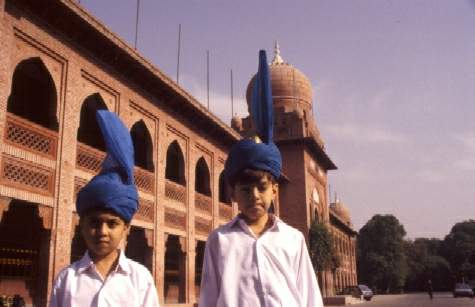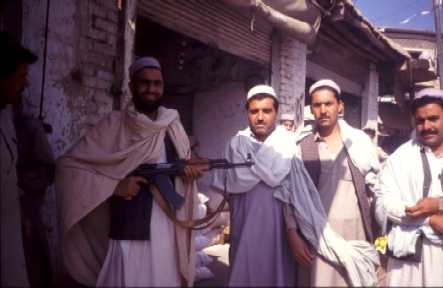THE LAST NABOBS ARE WELL, ALIVE, AND STAY IN PAKISTAN
 In the splendid city of Lahore, the old fashioned Victorian pearl of Pakistani Punjab, crowds of children wearing a typical "public school" British uniform, just orientalized by the blue turban on their head, are leaving at tea time the legendary Atchison College. This landmark of a prosperous colonial past is located in one of the poshest residential area: within range from the noisy and dusty downtown. But a world a difference separates these young boys from the herd, selling grenade juice in the dark lanes between Masti Gate and Anar-kali Bazaar. The
British founded Atchison College in the middle of the 19th-century.
Living
symbol of the Victorian Empire, the nickname of Atchison remains the
same
for decades: "The Nabobs’ college". There, plenty of princes, amirs,
maliks,
khan, shahs (people call them “nawabs”: the Urdu word for nabob) have
received
a first class education: the key to study one day in "Oxbridge" or a
good
American University like Berkeley or Harvard. Moreover, on the tens of
acres of the campus, it is possible to take horse-riding lessons (with
the ambition to join one day the "Super Paks" –nickname for the local
happy
few- Lahore Polo Club), jump in the unique Olympic swimming pool in
Lahore,
play cricket, pray in a private mosque… Developing closer relations
with
the sons of the elite: which is, at least, as useful as studying
geography,
foreign languages or mathematics with the best teachers in town!
 As a matter of fact, all the "Super Paks" I have met were coming from Atchison. Living in an elegant cantonment, a few kilometers away from the campus, H.E. Ambassador Khalid Amir Khan, "Malik" (chief) of a Pathan tribe (his ancestors were the highly respected and powerful Lodhis of Delhi), is still cultivating the nostalgia of his college. He inherited from Atchison his unmatchable British style and phlegm: which makes him somehow look like Peter Ustinov in its most exuberant parodies. Though the very private "Punjab Club", favourite meeting place for the upper class, doesn't sell Scotch whisky in its cosy bar -to the great displeasure of its distinguished members- Khalid Amir Khan likes to drink apple juice with his dark suited and slicked-back haired former school mates. Most of them are now successfully embarked in business, diplomacy and politics. "-We owe our success to Atchison", says Amir Khan. Everybody agrees in the cozy lounge. This is an open, effective and warm freemasonry: the mutual help is obvious between "Atchisonians". "-When you call a Minister in Islamabad or a businessman in Karachi, not to mention a Pakistani banker in London or Frankfurt, you speak to a friend, indeed", Amir Khan adds. But getting a British -which somehow sounds “globalized”- education doesn't mean dropping one's own and rich culture. When, after four hours of a slaloming drive on a busy road, avoiding the crash with gleaming trucks dedicated to Allah and decorated overcrowded buses, we arrived in his Trekhanwalla village, the British gentleman suddenly transformed himself into a typical nabob. Wearing white "shalwar" and "kamiz", an elegant turban pushed on his head by two servants, the "Malik" Amir Khan receives a warm welcome from the 4300 people working on the 1500 acres of land owned by his family in this isolated part of Punjab. The local peasantry likes its squire and master. This is so obvious when, reaching the edge of the village with our dusty Japanese car, a band begins playing music while a horse suddenly appears from a lane corner. In the pure Pathan tradition, two strong men make the animal dancing to express the pleasure they get from seeing their lord coming back. We were as much surprised and seduced as Rudyard Kipling, who wrote many pages about that proud people coming from the tribal areas from the North West Frontier Province close to Afghanistan. The
Pathans claim descent from a common ancestor, believed to have lived as
far as 20 or 30 generations ago. His name was Qais. The legend reports
he met Prophet Muhammad in Medina, and transported Islam back home with
him. We visited the scenic Khyber Pass area, and met the Afridis on
their
native land. Proudly equipped with Kalashnikov and heavier weapons (the
local jewels!) inherited from the Afghan warriors, this is an
illustrious
Pathan tribe from the south-west part of the Khyber. The chief of the
Afridis
is a "Malik", just like H.E. Khalid Amir Khan. But the way of life of
these
two nabobs is quite opposite. Though being a former mate of the Islamia
College (the equivalent in Peshawar of Atchison in Lahore), he has
never
moved from his native tribal area. The Afridis are still living on
smuggle.
Peddling narcotics, tobacco, or weapons is traditional here. There is
no
serious law against it. Political power and justice are 100% controlled
by the landlords... who are also the smugglers. The "Malik" Habib
Afridi
likes to compare his tribe to the gypsies: full of pride and freedom.
 But the Afridis are easy winners, who are familiar with the posh colleges and huge mansions: the home of Ayub Afridi -the Pakistani "Pablo Escobar"- is a fortified castle surrounded by high walls and video cameras. In their peculiar way of life and culture, the Afridis are regarded in their country like highly recommendable gentlemen, involved in the social life; their branch gave to the army its most valorous general and intelligence officers. Nabob Zaman Khan Afridi, the father of Habib, was a member of the County Assembly. In 1956, Habib's brother became a MP, and represents the western part of NWFP in the Assembly. Nabobs have much to do with politics. Isn't the new Prime Minister, Mrs Benazir Bhutto, daughter of Zulfikar Ali Bhutto: a rich Sindhi landlord from Larkhana? One of Zulfikar Ali Bhutto's best friend and closest adviser before he was executed by Zia’s regime in 1979, is Nabob Saddiq Hussain Kureshi. This gentleman receives us in his superb mansion in Multan: "Made in Pakistan" copy of the "White House" in Washington DC. With deep-rooted origins in the squire aristocracy (the Kureshi have been landlords for about 700 years), the family of Nabob Kureshi received a second peerage from the British. "-The title of nabob was given by the British Governor General every 1st of January, according to the Victorian rules", Saddiq Hussain Kureshi explains. Since the 1947 "Great Partition" of the sub-continent into Pakistan and India, his family is fully involved in politics. 1947 is the year when Nabob Saddiq Kureshi made a first decisive step in a successful political life. After being mayor of Multan and Governor of Punjab, he was appointed Minister of Agriculture and Food. He was the confident of Zulfikar Ali Bhutto, then Prime Minister of Pakistan, and received him many time in his residence for common hard work. "-Prime Minister Bhutto was always working, taking no or few meals! It was impressive to me", tells Nabob Kureshi who is a jolly good fellow enjoying fine dinning, luxury furniture, lovely women... but not politics any more: "-This is a dirty game. To succeed, one has to sacrifice so many things, including one’s soul". Quiet landlord, taking care with his son of his 500 acres of land, Saddiq Hussan Kureshi is served by 40 lackeys and now lives just like what he has always been: a nabob. By Gilles Malaisé Part
2: The Nabob of Bahawalphur
|





